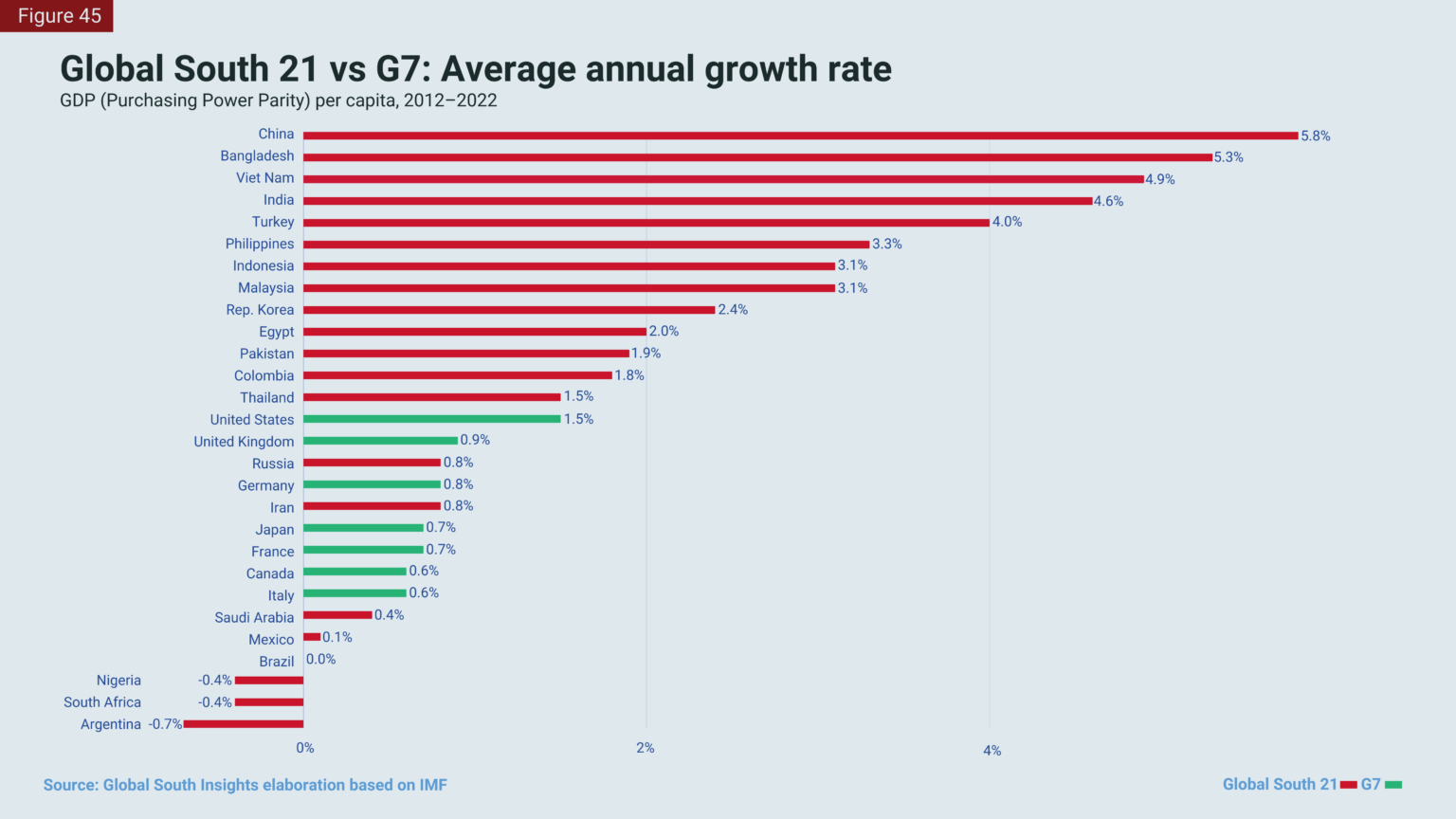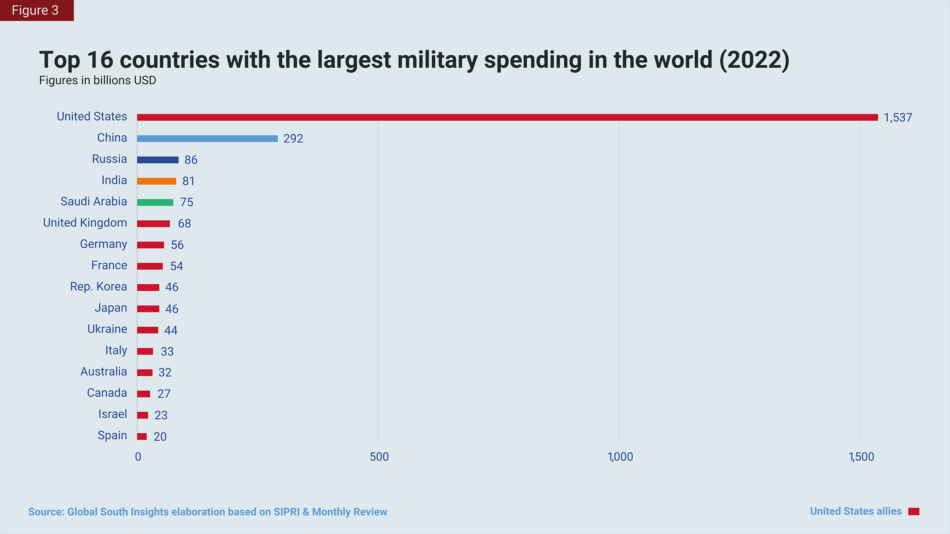Decline of USAmerican Hegemony
The relation of USAmerica to the rest of the world is one of extraction. It keeps other countries in a constant state of underdevelopment such that they can be used for cheap resources and cheap labor. Throughout the 1900s the US ran interventions on dozens of countries. Many of these examples were egregious: In 1954, Guatemala was overthrown because the American company United Fruit Company, today Chiquita, was upset that the Guatemalan government had taken land from them... that they weren't even using. Into the modern day, USAmerica runs interventions on states such as Iraq and Libya, killing over a million in the former and transforming the latter from a welfare state into a state where slaves are sold in open-air markets. The military is not the only axis on which the US imposes hegemony: it also imposes debt-traps, sanctions, and soft-power interventions like propaganda campaigns. As a very recent example, the US military ran a propaganda campaign in the Philippines to get the populace to mistrust Chinese COVID vaccines. And, of course, you have the undying Yankee support for Israel.
It is also that the USAmerican ability to impose its hegemony is slowly waning.
At the end of WWII, the US was the foremost world power. In the time of the New Deal, the US controlled half of the wealth in the world, and the majority of its production. By 1960, the US was responsible for 40% of world GDP. Today, it only is responsible for 25%. Its production is even worse, being a much lower percentage of GDP in the US than it is in Global South countries.
Measuring by GDP (PPP), which is based on the actual costs of goods within a country, the US is doing even worse, and is no longer the world's top economy: China is. By PPP, the US holds 15% of world GDP, and only 9% of world industry.
Growth rates also show a staggering difference between the US, its close allies, and the rest of the world.

The combined power of the US and its allies, generally referred to as the West, has been falling. The G7 has overall grown much slower than the Global South's largest economies. BRICS overtook the G7 in economic power not very long ago, and continues to grow at a great pace.
China, obviously, has had a meteoric rise in economic output, quickly becoming the world's factory and now becoming the world's market. It held, for decades, GDP growth averaging 10% annually, and still leads the world in GDP growth.
Other countries have, however, also had higher growth rates than the West. The Global South, excluding China, has recently overtaken the whole of the West in GDP (PPP).
The US has only had two major challenges to its hold on the world, since the end of WWII: the USSR, and China. The USSR never really had a chance: it never reached more than 40% of the US's GDP, it held combative relations from the very beginning, it spent, and in some ways was easily forced to spend, much of its economic resources on the military, which hurt its growth immensely.
China, on the other hand, already has 70% of the GDP of the US, and it is much better integrated into the world market. The trade war against China launched by Trump and continued by Biden has, in many respects, hurt the US more than it has hurt China. China simply cannot be beaten down economically in the way that the US beat down upon the USSR.
It would be a mistake to assume that the Global South as a whole is resolutely opposed to US hegemony in the way China, Russia, and other closed-off states are. Much of their GDP growth is tied to investments from the US bourgeoisie, which no longer finds such high profit rates in the US itself. However, the growth in wages and infrastructure in the Global South, alongside their GDP growth, belies an increase in the power of national interests. The US must increasingly turn to non-economic means to maintain power, both against its geopolitical opponents and against more neutral states.
There are three other major axes of power for an empire: Financial, Cultural, and Military. USAmerica has stronger legs on these.
When it comes to finance, the US has increasingly been willing to use its status as the distributor of the world's reserve currency to threaten other countries, or push problems onto them. This, in turn, creates demand for a new international currency to replace the dollar.
The US dollar hegemony allows it to pressure countries in three major ways.
Firstly, since 1971 (when the US dropped the gold standard), it allows the US to inflate its currency to lessen its debt to other countries, and lessen the value of their currency reserves. This was done with debt accrued from the Vietnam war, shortly after Nixon nixed the gold standard, causing worldwide inflation: the same could be done with the $35 trillion the US owes to other countries today, if the US needs to.
Secondly, it allows the US to monitor trading between countries. This is a major part of the effectiveness of US sanctions: countries found violating the sanctions may themselves have sanctions placed upon them. Covert trading between nations is much easier without using the US dollar platforms.
Thirdly, it allows the US to directly confiscate the money that another country holds as its foreign currency reserve. At the outbreak of the war between Russia and Ukraine, the US threatened to confiscate the $300 billion Russia held in the US Treasury. That they are willing to threaten this against Russia implies that they'll do the same against any other country that their relationship with turns sour.
While the dollar is increasingly under scrutiny in the international sphere, especially since 2022, it still may be decades before a competitor emerges. The most likely competitor, a currency issued by BRICS, would likely only be used for internal trading and would not be meant as a direct dollar competitor, due to some members not wanting to risk animosity from the US. Thus, the US continues to wield significant financial clout, mostly expressed through sanctions.
Culturally, the US has a strong hold worldwide. Most people alive are exposed to our media from an early age, made to know our cultural icons, encouraged to identify with us rather than themselves. This is not something I'm studied on, so I can't go into how it actually affects geopolitics.
Militarily, the US is at a strong advantage over other nations. According to a persuasive article published by the Monthly Review, the US government spends as much as twice the amount on the military as it admits. Besides that, even with official numbers, the US spends far more than the next few nations combined. Where the rest of the world has made great strides over the US in terms of industry and production, the US still owns all the military industry and production.

It is my understanding that the US has maintained this rate of military spending, far more than the rest of the world, over many decades, because it was a necessary component of its hegemony over the world. It would be naïve to assume that, up until now, the US's military budget has been superfluous or idiotic, as the liberal-progressive stance on the US military tends to characterize it. So the massive gulf between the US and China does not necessarily mean that the US can immediately direct all its resources into a war with China. The US does, however, have advanced technology and production capabilities, evidenced by its present and past absurd amounts of military spending. If the Global South wanted to compete with the US and its allies on military spending, then they probably could, but they could not immediately compete on production or technology (and so there would be little to spend that money on).
The USSR and the US were military equals for some time. This was ultimately unsustainable, because of the impact it had on the USSR economy, but it was what allowed the cold war to remain cold for so long. The present Global South is a different story.
The Global South, for all its newfound economic strength, does not have the military expertise that the US and its allies have, and is nowhere near as coherent as a political-military bloc. Comparing this graph above with the graph on economic growth, if the US intends to maintain its power over the rest of the world--which is the only thing keeping it so wealthy--its course of action is incredibly obvious.
This is the basic reason it makes sense to view the US as the instigator of the war in Ukraine- the US prefers to be in military conflicts with nations that stand up to it, like Russia. This is why the US was eager to push NATO eastwards, and why the US is willing to promote Ukraine's entrance into it. The US is doing this to maintain its hegemony, not out of some humanitarian concern for the Ukrainian people (who, unlike the US, would prefer a quick and clean victory over Russia). What would be the best for the Ukrainians would be having Russia as a friendly trading partner; the US prevented that in 2014.
It also is why it's concerning to see the US business and political spheres become increasingly sinophobic and "decoupled" from China, and concerning that the US is increasingly arming Taiwan and the Philippines, alongside encouraging Japan to reinvigorate its military.
Regardless of one's opinions on Russia or China, a war against them to "free" their citizens would be disastrous for everyone involved. Installing a US puppet government will not benefit the Russian or Chinese people, who deserve to be able to decide their own destiny; and in the chance we've all been lied to about the socialist countries, maybe the CPC isn't so much of a problem for the world as the USAmerican government is, under (necessarily) increasingly fascist rule, turning out to be.
If it happens, a war against either power would be a last, feeble grasp at world hegemony. There is no winning, long-term: the material conditions of the world simply do not support a long-term empire. The US cannot permanently reverse its own trend of falling profit, and it can't undo the fact that it contains a small minority of the world's resources, human or otherwise. The empire will fall. The question is: can it fall fairly peacefully, without causing nuclear winter?